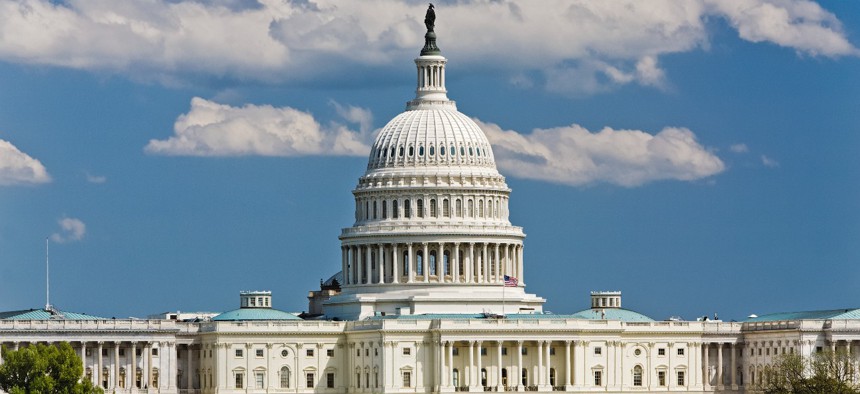
Rudy Sulgan / Getty Images
The Fiscal 2022 Spending Bill Has Government Oversight and Transparency Provisions
March 13-19 is National Sunshine Week, which champions open government.
The fiscal 2022 government funding bill that President Biden signed into law earlier this week contains several provisions to increase government accountability and transparency.
Biden signed the bill on Tuesday, which happened to come during National Sunshine Week—meant to champion open government.
“Two provisions in the bill will increase transparency into apportionment, the executive branch tool used to allocate funds as directed by Congress,” said the Project on Government Oversight, in a post. “With the enactment of this legislation, the Office of Management and Budget will be required to notify Congress when it is allocating funds and explain any conditions the executive branch is applying to the use of funds.”
Apportionments were “made famous” under President Trump due to his handling of funds to Ukraine that led to his first impeachment in the House, wrote Matthew Lawrence, associate professor of law at Emory Law. Democratic lawmakers sought to make reforms in the months after the impeachment and the Government Accountability Office found the Trump administration violated the Impoundment Control Act with certain funds to Ukraine (the watchdog said earlier this year that other funds to Ukraine were handled properly.) Meanwhile, Republicans accused the Biden administration of violating the same law with border wall funds, but that turned out not to be the case, according to GAO.
“This bill also empowers agencies to tell Congress if they receive notice about funding that would delay or disrupt actions Congress has already appropriated funds for,” said POGO, noting that these provisions were included in the Protecting Our Democracy Act, which garnered much support from government oversight, transparency, ethics and accountability groups.
Experts previously told Government Executive that the way to enact long-term government reforms, such as with ethics, and put guardrails on issues exposed by Trump is through legislation, such as the Protecting Our Democracy Act.
Lastly, other provisions in the omnibus would bolster protections for intelligence community whistleblowers, such as by creating “consistent protections” for those that disclose mismanagement and extending protections for more intelligence community members, said POGO. The bill additionally has a provision that clarifies that the intelligence community inspector general and is the only one with authority to handle “urgent concern” whistleblower complaints.
The limited protections for whistleblowers in the intelligence community also came under scrutiny during the first impeachment inquiry into Trump.
POGO applauded these provisions. However, “unfortunately, there were quite a few things that were left out, again, because we were looking at those Senate fixes out of the Senate Select Committee on Intelligence,” Melissa Wasser, policy counsel at POGO, said on Federal Drive. For example, “there’s no language in the omnibus that would create security officers within IG offices that would provide guidance and direction to whistleblowers.”
The spending package is not the only recent legislation with transparency, accountability and ethics-related provisions.
Sens. Tammy Duckworth, D-Ill., and Patrick Leahy, D-Vt., reintroduced legislation that would direct the attorney general to publish all Office of Legal Counsel opinions online for the public to view and document why any redactions were made. POGO and Demand Progress, a grassroots organization that works to hold the government accountable and combat concentrated corporate power, endorsed it.
Also, Rep. Tom O’Halleran, D-Ariz, unveiled a package of five bills (some new, some that had been introduced before) on Thursday aimed at safeguarding taxpayer funds, ending government shutdowns and limiting the revolving door between government and industry.
On the Republican side, Sen. Josh Hawley, R-Mo., introduced legislation on Thursday that would “restore” the Special Inspector General for Pandemic Recovery’s jurisdiction after a legal opinion narrowed it last year, and would provide the IG with more funding, after the office warned it was running out of money. He blasted the administration for having “gutted” its special IG’s authority, but Jason Miller, OMB deputy director for management, defended the actions during a hearing on Thursday.







